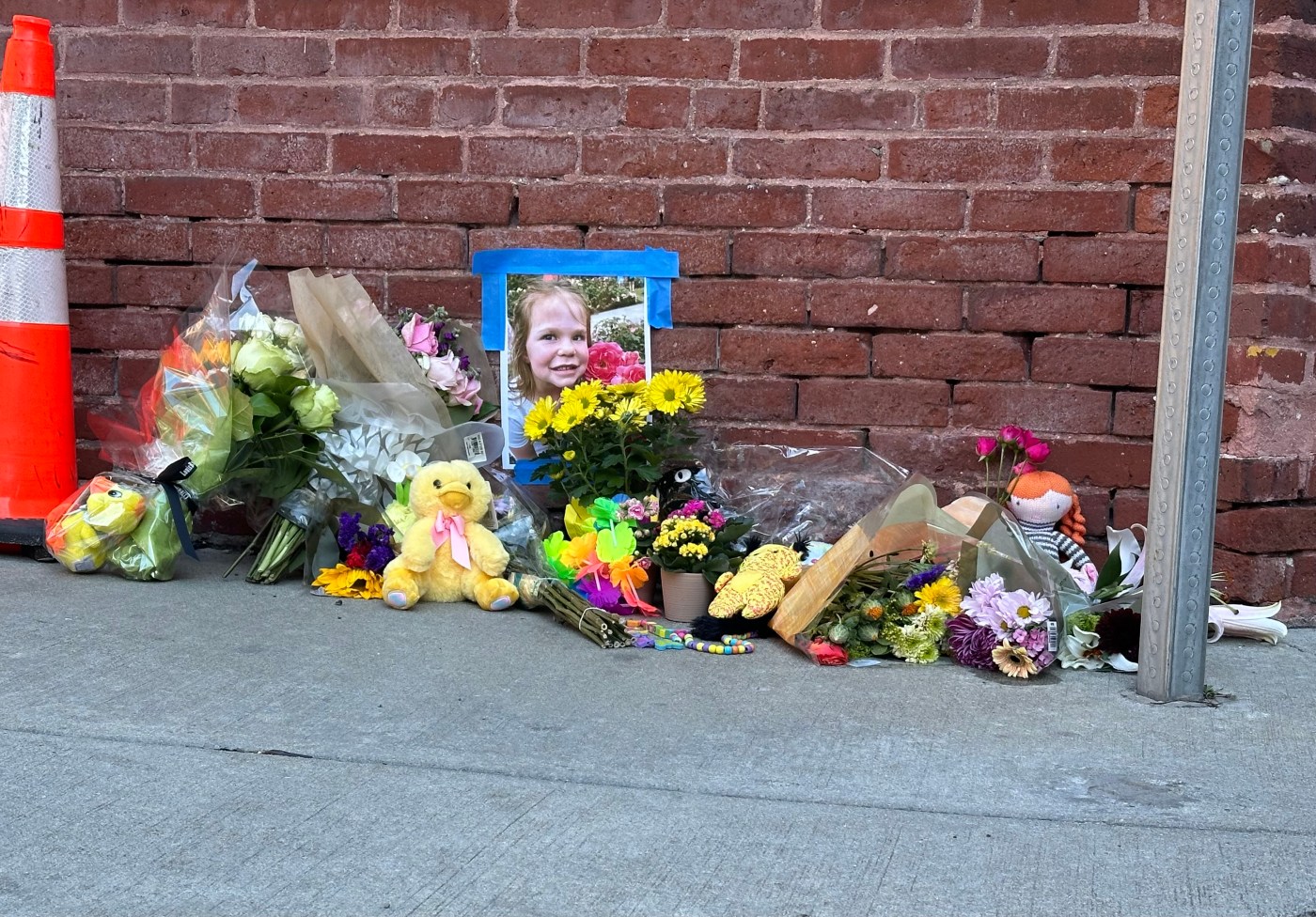
Temporary safety upgrades coming to South Boston intersection where 4-year-old was killed
Charles Joseph knows first-hand the perils that come with crossing an intersection on the backside of the Boston Children’s Museum at South Boston’s Sleeper and Congress Streets.
He bought a condo on Sleeper Street in 1985, drives by the area five or six times a day, and said he constantly sees young kids and families running down the sidewalk to a crossing where a 4-year-old girl was killed after being hit by a vehicle last weekend.
“They’ve been at the museum. They’re all pumped up. They start running down the sidewalk,” he told the Herald Saturday morning. “I see parent after parent, hoping somebody who can move faster with a big arm, kind of grabbing them and herding them in. So it’s totally understandable how the little girl ended up in the street.”
Joseph was one of more than a dozen residents who joined city officials at a gathering to remember Gracie Gancheva, a 4-year-old from Denver, Colorado, who was hit by a truck shortly after 5 p.m. Sunday and was later declared dead at Massachusetts General Hospital.
Locals who showed up Saturday said the intersection at Sleeper and Congress streets can be dangerous for pedestrians and drivers who are not paying attention, with one resident describing driving on Congress Street as the “wild, wild west.”
A city official said Mayor Michelle Wu’s administration is in the process of putting in place temporary safety upgrades, including removing a parking spot on the southeast corner of the intersection to increase the visibility of a crosswalk.
Boston Chief of Streets Jascha Franklin-Hodge said “multiple city staff engineers, planners” were looking at the area to see what improvements could be made quickly like adding additional markings and barriers and restriping all of the pavement markings and crosswalks in the neighborhood.
“We’re looking at additional changes that we can make at this intersection and in the surrounding area to ensure that the basic safety infrastructure that we rely on, that the signs are there, that we have the warnings for drivers, that pedestrians can see where they’re going, and they can see cars that may be turning,” he said.
The city has long been planning upgrades to Congress Street, a major arterial road that connects South Boston to downtown, like “significantly” wider concrete sidewalks on both sides of the street, new crosswalks, bike lanes, and places for cars to briefly pull over.
The project includes reconstructing Sleeper Street between Congress Street and Seaport Boulevard with accessible sidewalks and a raised crosswalk for Martin’s Park, according to the city’s website.
Raised crosswalks for Sleeper and Farnsworth Streets along Congress Street will “slow turning vehicles and make pedestrians more visible,” according to a presentation from the city.
Franklin-Hodge said the project is in the final stages of planning and design.
“We expect to have it bid out for construction later this year and into construction by early next year. We’re looking at whatever we can do to accelerate that timeline but … we anticipate it will be fully funded in the budget,” Hodges said.
Tom Ready of the Fort Point Neighborhood Association said that after public meetings on the project over the past few years, most people “felt comfortable” with the redesign because it would slow cars down and “provide a safe environment for pedestrians and support bikes in the neighborhood.”
But as the neighborhood continued to work with the city on “some of the deficiencies” in the neighborhood, the scope of the project increased, Ready said.
“That’s what’s, frankly … slowed things down and I guess maybe we were trying to be too perfect and trying to get too much done. But in the end, what we’re after is for exactly what they said they want to do,” he said. “We recognize that construction time frames can be difficult, but that shouldn’t prevent (the city) from doing temporary things out here immediately.”
Ready said the neighborhood association asked the city to assign a police detail to patrol the area and the intersection ahead of April School Vacation Week to protect kids who come and go from the Boston Children’s Museum and Martin’s Park.
The one block area that includes the museum and the park saw over 1 million visitors before the pandemic in 2019, said Charlayne Murrell-Smith, the vice president of external relations and corporate development for Boston Children’s Museum, who is also a trustee for the park.
Murrell-Smith said those numbers are quickly returning.
“We do believe that the museum and the park need to be thought of differently and considered in the same context as a school zone and with some particular additional kinds of warnings and notifications that exist around schools,” she said. “We know that there are policy changes that need to take place for that to happen.”
Franklin-Hodge said implementing a school zone around the museum and park is technically against state law but the city is looking at creating a reduced speed zone around the area.
“There’s a couple of different, other types of speed controlled zones that are allowed in different circumstances. And so we’re looking at all those options to see what we could do potentially around here,” he said. “We do have some legal authority to do what’s called a safety zone and we’re trying to figure out if that can be applied here.”
The area where a 4-year-old girl was hit by a truck and killed at Congress and Sleeper streets. (Matt Stone/Boston Herald)

